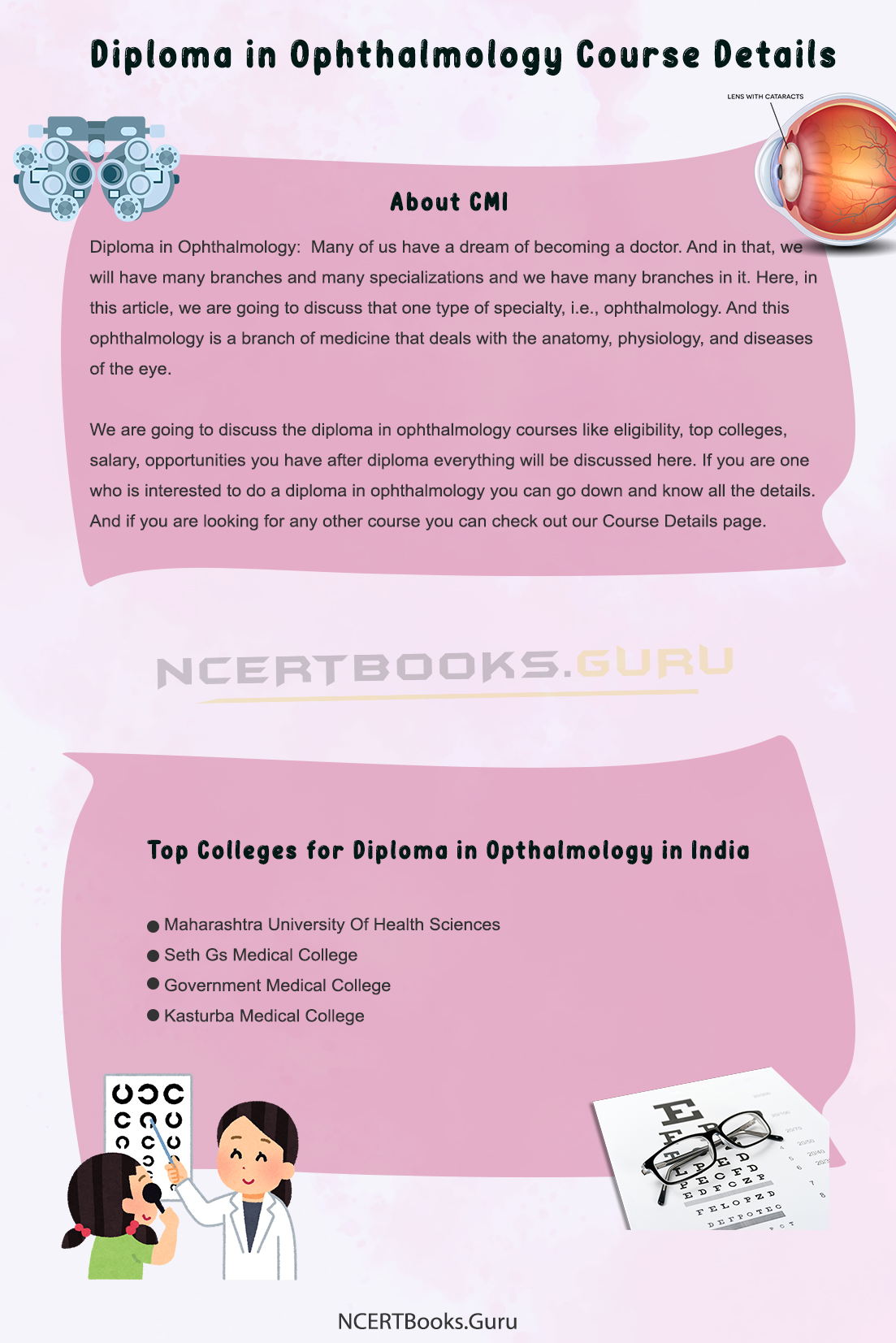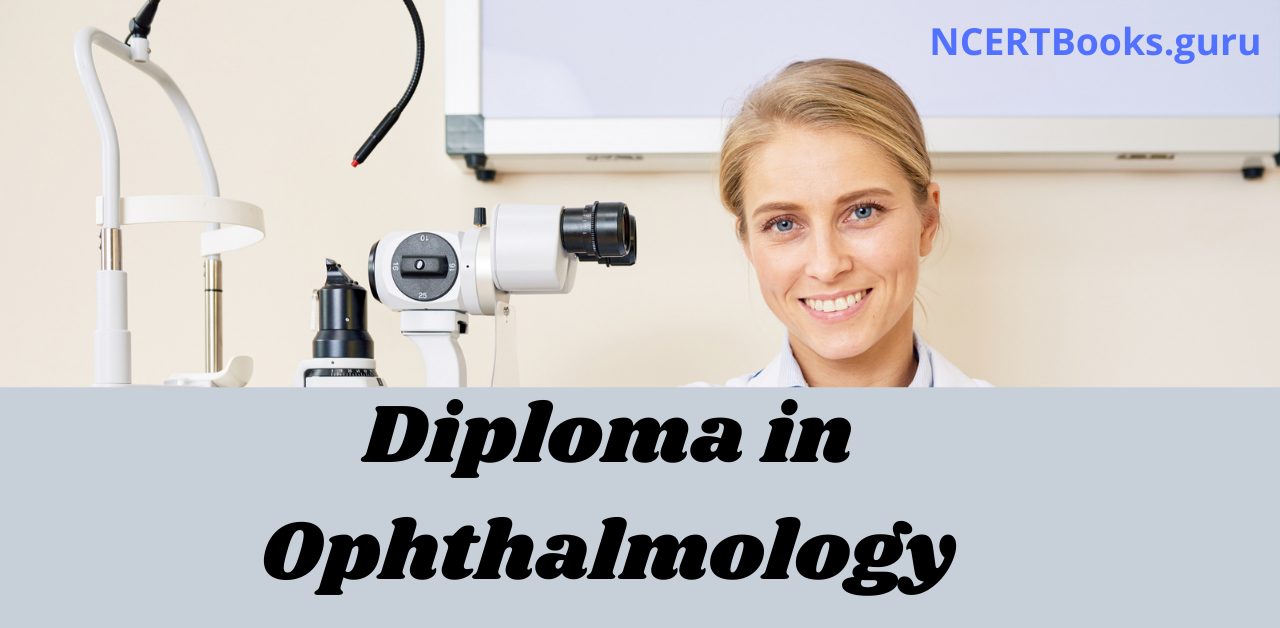Diploma in Ophthalmology: Many of us have a dream of becoming a doctor. And in that, we will have many branches and many specializations and we have many branches in it. Here, in this article, we are going to discuss that one type of specialty, i.e., ophthalmology. And this ophthalmology is a branch of medicine that deals with the anatomy, physiology, and diseases of the eye.
We are going to discuss the diploma in ophthalmology courses like eligibility, top colleges, salary, opportunities you have after diploma everything will be discussed here. If you are one who is interested to do a diploma in ophthalmology you can go down and know all the details. And if you are looking for any other course you can check out our Course Details page.
- Highlights of Diploma in Ophthalmology
- Eligibility Criteria For Diploma Ophthalmology Course
- Admission Process for Diploma Course in Ophthalmology
- Diploma in Ophthalmology Syllabus
- Entrance Exams for Ophthalmology Diploma Course
- Benefits of Studying Diploma Opthalmology
- Recommended Books for Opthalmology Course
- Diploma in Opthalmology Fees
- Top Colleges for Diploma in Opthalmology in India
- Employment Areas after Diploma
- Career Options with the Salary After Opthalmology Diploma Course
- FAQs of Diploma in Ophthalmology After 12th
- Conclusion
Highlights of Diploma in Ophthalmology
Here we will discuss some highlights that are all the details about this course and also what we are going to cover in this course.
| Course Name | Diploma in Ophthalmology |
| Course level | Graduation |
| Course duration | 2-3 Years |
| Course Fees | Up to 5 lacs |
| Eligibility criteria | 10+2 |
| Admission Process | Entrance exam |
| Examination Type | Semester wise |
| Salary | Upto 20 lacs per annum |
| Top Recruiting Companies | Indian Nursing Council, State Nursing Councils, Metro Hospital, Max hospital, Indian Red Cross Society, AIIMS, Fortis Hospital, Kailash Hospital, Orphanage, etc. |
| Job Positions | Associate Professor, Super Specialty Consultant, Sales Executive, Product Manager, Area Sales Manager, Zonal Sales Manager, Consultant, ophthalmology, OT Technician, etc. |
Eligibility Criteria For Diploma Ophthalmology Course
Let us look into the eligibility criteria that you need for this diploma course.
- Candidate must be completed 10 + 2 in any recognized board of education with a minimum 50 % percentage, in any stream.
Admission Process for Diploma Course in Ophthalmology
To get admission to any college or university we have different steps to follow. And these admission processes may vary from college to college. The admission process will be done by the entrance exams in some colleges and in some other colleges, there will be a merit-based admission.
- Firstly, colleges or universities release an application form online. And you need to register in that application form to join.
- Then, if you are eligible for any of those you can fill out the application form as per the given instructions.
- And then, you need to provide your contact details for verification.
- Then, you need to submit the asked documents in the given format.
- And you need to pay the fee through online payment modes.
- Submit the application form.
- Next, if it is merit-based it is ok, otherwise, you should write the entrance examination and get the cut-off mark.
Diploma in Ophthalmology Syllabus
We are going to provide the syllabus according to many universities and colleges.
| Sr. No. | Subjects of Study |
| A | Applied Basic Sciences in Ophthalmology |
| 1 | Anatomy and Physiology |
| a) Anatomy of the eye and ocular adnexa b) Embryology of the eye and adnexa. c)Binocular vision and its development d) The visual pathways e) Physiology of vision, color vision, accommodation f) Physiology of aqueous humor and its circulation and maintenance of Intraocular Pressure. g) Maintenance of intraocular pressure h) The Neurology of vision (Visual pathway, papillary pathways, and reaction) dark Adaptation. i) Optics – elementary Physiological optics, optics of radioscopy and other dark Room procedures and ophthalmic types of equipment. j) Anatomy and Physiology of motor mechanism k) Blood aqueous barrier. l) Tear circulation m) Maintenance of corneal transparency. |
|
| 2 | Pathology and Microbiology |
| a) Pathology of ocular and adnexal lesions (Inflammatory, neoplastic, lens specification, etc) b) Virus – Herpes Zoster, Simplex, adenovirus, trachoma, etc. c) Microbiology of common organism affecting the eye – Bacteria Staph. Strepto – pneumococci, gonococci diphtheria, Morax axenfield bacillus, AFB, Lepra bacilli, Pseudomonas, etc. d) Parasites, protozoa, and fungi causing coular lesion e.g., toxoplasma amoebiasis, toxocariasis, Treponema, cysticercus, hydatid, microfilaria aspergillus, Penicillium, candida, etc. |
|
| 3 | Biochemistry |
| a) Vitamin A and its metabolism b) Aqueous composition c) Glucose Metabolism d) Biochemical aspects of cataract (Senile and diabetic) e) Tear film and its composition. f) Thyroid function tests |
|
| 4 | Pharmacology |
| Pharmacology of drugs used in Ophthalmology– a) Autonomic drugs – Sympathomimetic, Sympatholytics, cholinergic, anticholinergic agents, etc. b) Anti-inflammatory agent – steroid and non-steroidal agents c) Antibiotics and chemotherapeutic agents used in ophthalmology d) Local anesthetics e) Antivirals and antifungals used in ophthalmology f) Dyes used in ophthalmology – fluorescein, rose Bengal, etc. g) Tear Substitutes h) Drugs used to reduce intra ocular pressure (systemic and topical agents) i) Anti-mitotic agents and immunosuppressive j) Ocular penetration of systemically administered drugs and topical agents. |
|
| 5 | Optics |
| B | Clinical Ophthalmology including Refraction |
Entrance Exams for Ophthalmology Diploma Course
For getting admission in any college, and if that college gives admission on the basis of entrance exam. you need to prepare for entrance exams and you need to get the cut-off marks. This is different from college to college.
- NEET
- AJEE
- MNS Entrance Exam
Benefits of Studying Diploma Opthalmology
Here, we will look into the benefits of studying this ophthalmology are given below:
- Students take up research work with organizations such as ICMR.
- After the study of the ophthalmology course, you have better opportunities available in private hospitals, clinics, missionary hospitals, NGOs, charitable hospitals.
- You can also begin your career in the research or teaching area if you have done any specialization.
Recommended Books for Opthalmology Course
Here are some of the books that are recommended to study ophthalmology. You need to add all these books to their books shelf. some of the reference books are given below.
- Textbook of Ophthalmology for Paramedical Courses, S. B. Gupta, S. Agarwal.
- Textbook of Ophthalmology, HV Nema, Nitin Nema.
- Ophthalmic Assistant, PK Mukherjee.
- Ophthalmology: A textbook for diploma students, Patrick Dacre Trevor-Roper.
Diploma in Opthalmology Fees
The fee structure can be different from college to college. And for this diploma study, we have both private and government colleges. The average course fee for private colleges will be Rs.15,000 to Rs.1.5 Lakhs. And the average course fee for government colleges is Rs.5,000 to Rs.35,000.
Top Colleges for Diploma in Opthalmology in India
Many colleges are offering this course in India. Here we have both government and private colleges. Some of the colleges are listed below:
- Maharashtra University Of Health Sciences
- Seth Gs Medical College
- Government Medical College
- Kasturba Medical College

Employment Areas after Diploma
We will look into the employment areas that have after diploma. Some of these employment areas are given below.
- Government Hospitals
- Medical Continent Writing
- Colleges & Universities
- Defense Services
- Nursing Homes
Also, Refer:
Career Options with the Salary After Opthalmology Diploma Course
Here we are going to discuss the career options with the salary after completion of this course.
| Job Profile | Average Salary |
|---|---|
| Super Specialty Consultant | 3 – 4 Lakhs Per Annum |
| OT Technician | 9 – 10 Lakhs Per Annum |
| Consultant Ophthalmology | 1.5-3 Lakhs Per Annum |
| Associate Professor | 1.5 – 4 Lakhs Per Annum |
| Area Sales Manager | 10 – 11 Lakhs per Annum |
| Product Manager, Zonal Sales Manager | 5 – 6 Lakhs per Annum |
FAQs of Diploma in Ophthalmology After 12th
1. Is studying for a diploma in ophthalmology from a private college good?
Yes, it is beneficial to study diploma courses from private colleges is beneficial. There are great placements and opportunities we have when we have studied in private colleges.
2. What are the opportunities we have after a diploma in ophthalmology?
If you study diploma in ophthalmology we have many opportunities like a supervisor in ophthalmic glass, ophthalmic technician, refraction assistant, and many.
3. Is an optometrist a doctor?
No, An optometrist is not a doctor, but someone who is licensed to practice optometry.
Conclusion
Hope that the complete information that was given above is very useful. And still, if you have any doubts about the course details you can just comment us in the comment section by signing up. And stay tuned to the NCERTBooks.guru for more course details. And after this course, there are many best opportunities that build your career.
